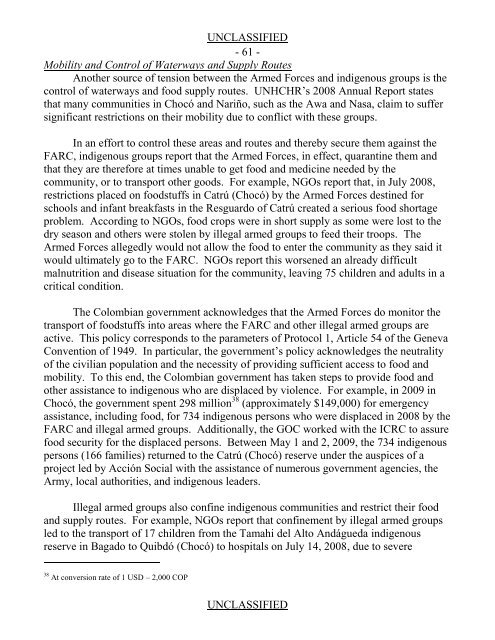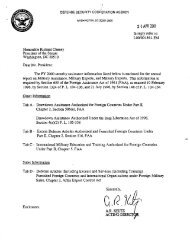memorandum of justification concerning human ... - Just the Facts
memorandum of justification concerning human ... - Just the Facts
memorandum of justification concerning human ... - Just the Facts
You also want an ePaper? Increase the reach of your titles
YUMPU automatically turns print PDFs into web optimized ePapers that Google loves.
UNCLASSIFIED<br />
- 61 -<br />
Mobility and Control <strong>of</strong> Waterways and Supply Routes<br />
Ano<strong>the</strong>r source <strong>of</strong> tension between <strong>the</strong> Armed Forces and indigenous groups is <strong>the</strong><br />
control <strong>of</strong> waterways and food supply routes. UNHCHR‘s 2008 Annual Report states<br />
that many communities in Chocó and Nariño, such as <strong>the</strong> Awa and Nasa, claim to suffer<br />
significant restrictions on <strong>the</strong>ir mobility due to conflict with <strong>the</strong>se groups.<br />
In an effort to control <strong>the</strong>se areas and routes and <strong>the</strong>reby secure <strong>the</strong>m against <strong>the</strong><br />
FARC, indigenous groups report that <strong>the</strong> Armed Forces, in effect, quarantine <strong>the</strong>m and<br />
that <strong>the</strong>y are <strong>the</strong>refore at times unable to get food and medicine needed by <strong>the</strong><br />
community, or to transport o<strong>the</strong>r goods. For example, NGOs report that, in July 2008,<br />
restrictions placed on foodstuffs in Catrú (Chocó) by <strong>the</strong> Armed Forces destined for<br />
schools and infant breakfasts in <strong>the</strong> Resguardo <strong>of</strong> Catrú created a serious food shortage<br />
problem. According to NGOs, food crops were in short supply as some were lost to <strong>the</strong><br />
dry season and o<strong>the</strong>rs were stolen by illegal armed groups to feed <strong>the</strong>ir troops. The<br />
Armed Forces allegedly would not allow <strong>the</strong> food to enter <strong>the</strong> community as <strong>the</strong>y said it<br />
would ultimately go to <strong>the</strong> FARC. NGOs report this worsened an already difficult<br />
malnutrition and disease situation for <strong>the</strong> community, leaving 75 children and adults in a<br />
critical condition.<br />
The Colombian government acknowledges that <strong>the</strong> Armed Forces do monitor <strong>the</strong><br />
transport <strong>of</strong> foodstuffs into areas where <strong>the</strong> FARC and o<strong>the</strong>r illegal armed groups are<br />
active. This policy corresponds to <strong>the</strong> parameters <strong>of</strong> Protocol 1, Article 54 <strong>of</strong> <strong>the</strong> Geneva<br />
Convention <strong>of</strong> 1949. In particular, <strong>the</strong> government‘s policy acknowledges <strong>the</strong> neutrality<br />
<strong>of</strong> <strong>the</strong> civilian population and <strong>the</strong> necessity <strong>of</strong> providing sufficient access to food and<br />
mobility. To this end, <strong>the</strong> Colombian government has taken steps to provide food and<br />
o<strong>the</strong>r assistance to indigenous who are displaced by violence. For example, in 2009 in<br />
Chocó, <strong>the</strong> government spent 298 million 38 (approximately $149,000) for emergency<br />
assistance, including food, for 734 indigenous persons who were displaced in 2008 by <strong>the</strong><br />
FARC and illegal armed groups. Additionally, <strong>the</strong> GOC worked with <strong>the</strong> ICRC to assure<br />
food security for <strong>the</strong> displaced persons. Between May 1 and 2, 2009, <strong>the</strong> 734 indigenous<br />
persons (166 families) returned to <strong>the</strong> Catrú (Chocó) reserve under <strong>the</strong> auspices <strong>of</strong> a<br />
project led by Acción Social with <strong>the</strong> assistance <strong>of</strong> numerous government agencies, <strong>the</strong><br />
Army, local authorities, and indigenous leaders.<br />
Illegal armed groups also confine indigenous communities and restrict <strong>the</strong>ir food<br />
and supply routes. For example, NGOs report that confinement by illegal armed groups<br />
led to <strong>the</strong> transport <strong>of</strong> 17 children from <strong>the</strong> Tamahi del Alto Andágueda indigenous<br />
reserve in Bagado to Quibdó (Chocó) to hospitals on July 14, 2008, due to severe<br />
38 At conversion rate <strong>of</strong> 1 USD – 2,000 COP<br />
UNCLASSIFIED



